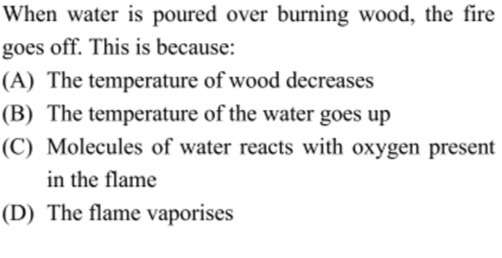Question
Question: When water is poured over burning wood, the fire goes off. This is because:...
When water is poured over burning wood, the fire goes off. This is because:

The temperature of wood decreases
The temperature of the water goes up
Molecules of water reacts with oxygen present in the flame
The flame vaporises
The temperature of wood decreases
Solution
Water absorbs heat from the burning wood, causing its temperature to fall below its ignition point. This is due to water's high specific heat capacity and its high latent heat of vaporization, which allows it to absorb a large amount of thermal energy as it turns into steam. When the wood's temperature drops below its ignition temperature, the combustion reaction can no longer be sustained, and the fire is extinguished. Option (B) is incorrect because while the water's temperature does rise, this is a consequence of heat absorption, not the primary reason for extinguishing the fire. Option (C) is incorrect as water molecules do not typically react with oxygen in a way that extinguishes wood fires; water is a stable molecule and a product of complete combustion. Option (D) is incorrect because the flame is the visible gaseous part of the fire, and it is the fuel (wood) that stops burning, not the flame itself vaporizing.
